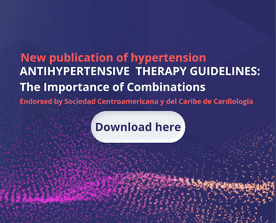
Efficacy and Adherence to treatment
Efficacy and Adherence to treatment: the virtuous circle in the management of Arterial Hypertension
The global trend in the prevalence and incidence of arterial hypertension in the last 30 years demonstrates that there continues to be a large gap in the number of hypertensive patients without a diagnosis and those treated, but without adequate control. This fact, associated with the increase in life expectancy, suggests that, over the next 30 years, there will be a marked increase in the number of cardiovascular deaths, going from 17 million currently to an estimated 37 million. In the last three decades, various efforts have been made globally to increase early diagnosis and improve the control of hypertensive patients; however, the impact in terms of morbidity and mortality is still not desired.
In relation to the difficulty in appropriately controlling hypertensive patients, we know that there are different factors that influence this problem; however, poor adherence to pharmacological treatment must be highlighted as one of the most important, since it is directly related to its effectiveness and this translates into a greater number of consultations, hospitalizations, mortality and costs for health systems. There are several areas that can directly influence treatment adherence:
-
Those related to the disease (the presence of few or no symptoms makes the patient perceive that it is not so important to have the pressure controlled).
-
Those related to the patient (non-compliance due to forgetfulness, unwanted effects, other comorbidities).
-
Those related to the medication (adverse effects, complex, ineffective regimens).
-
Those related to the socioeconomic status of the patient (medication costs).
-
Those related to the health system (lack of availability of adequate medications).
As you can see, the problem of adherence to chronic medication is complex and to this we must add that we do not have precise diagnostic tools for its detection and that it is difficult to modify; since it takes time and multidisciplinary work This fact is reflected in the different records of adherence to chronic medication at a global level, where the adherence rate is less than 50% and if we take into account cardiovascular diseases, only one in two patients does not have adequate adherence to their medication.
When we talk about adherence to a medication, we refer to the initiation, implementation and persistence in taking it. This process not only involves the patient, but also the treating doctor. Factors related to the medical field have been identified that can worsen patient adherence, such as: therapeutic inertia, inadequate prescription, complex therapeutic regimens, poor patient education, and health system problems. These are important factors that must be improved since they can impact the health prognosis of patients.
One of the most studied points in this regard has been the use of combined regimens in a single tablet. Today we know that two drugs combined for the treatment of high blood pressure in a single tablet can achieve up to 60% success rate in controlling blood pressure and if the combination is with 3 drugs in a single tablet, the success rate in controlling blood pressure can exceed 90%. In such a way that it not only improves effectiveness, but also drug tolerance, adherence and both cardiovascular and cerebrovascular protection. This translates into a reduction in hospitalizations, fatal outcomes and reduced costs for health systems.
The majority of surveys carried out globally show the most frequent reasons why hypertensive patients do not adhere well to their treatment: forgetting to take medication, discontinuing medication, presence of adverse effects and perception they do not need medication since they have no symptoms. Based on these findings, it is of utmost importance to reinforce patient education, emphasizing the relevance of persistence in taking their medications, identifying barriers that may interfere with adequate compliance, measuring adherence if possible, and simplifying regimens of medication and work together supported by nurses and pharmacists “multidisciplinary teams” that facilitate the most timely management.
Instruments for detecting drug adherence are important because they give us a clearer picture of which are the priority points to intervene in patients. If we consider that the majority of patients do not have good adherence due to forgetting to take the drug, actions such as: fixed pharmacological combinations in a single tablet, intelligent packaging, smaller tablets, more accessible costs, better taste of the medications and Digital tools to improve compliance with the intake could improve adherence by 32%, 18%, 14%, 9% and 6% respectively.
In summary, efforts should be made to improve medication adherence in hypertensive patients, since this is a point of vital importance for the prevention of fatal outcomes. For this, education continues to be the fundamental pillar, it must always involve the patient and the family, it must be supported by a multidisciplinary team that generates a more comprehensive management (nursing, pharmacists) and it must provide the patient with the necessary tools for better control.
Summary created by Dr Luis Lainez from the symposium: Treatment efficay and adherence: the virtuous circle in the hypertension management of the European congress of Cardiology (Amsterdam) 2023 (https://esc365.escardio.org/presentation/270364?query=%20servier)
SCAC 10/23 DM 614 SERVIER – For the exclusive use of the health care professional

Keep up to date with our content
Subscribe to our newsletter so that you are always up to date with the news.


